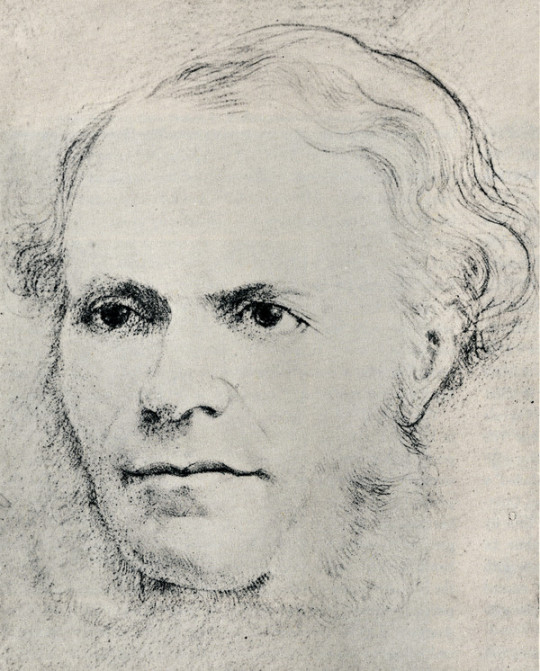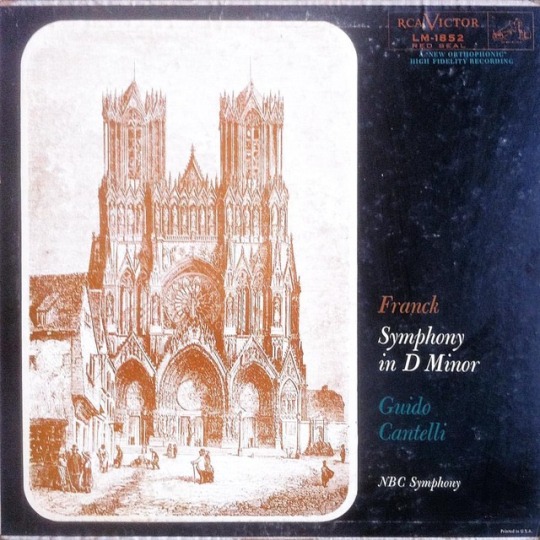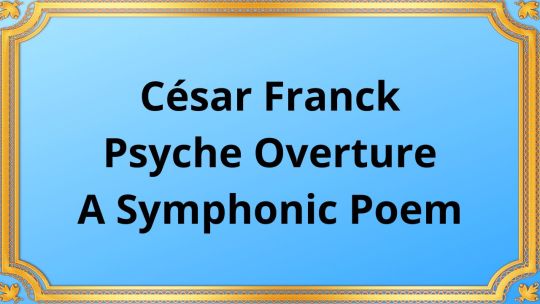#CésarFranck
Explore tagged Tumblr posts
Text
César Franck The Accursed Hunter (1951)

Publication date 1951
Sir Thomas Beecham
The Royal Philharmonic Orchestra
César Franck, one of the most renowned composers of the Romantic era, holds a significant place in the annals of classical music. Known for his symphonic works and chamber music, Franck's compositions are characterized by his distinctive harmonic language and meticulous craftsmanship. One of his most famous symphonic poems is "Le Chasseur Maudit" or "The Accursed Hunter," a piece that brilliantly encapsulates Franck's genius.
"The Accursed Hunter" is a musical portrayal of a narrative poem by German poet Gottfried August Bürger. The story tells of a count who, ignoring the church's call to worship, opts instead for a day of hunting. This defiance incurs divine wrath, and he is cursed to be hunted eternally by demonic forces.
Franck's composition is a sonic embodiment of this dramatic tale. The work is divided into four continuous sections, each representing different stages of the narrative. The introduction sets the scene with a peaceful, pastoral theme, symbolizing the count's quiet life before his transgression. The melody is warm and serene, played primarily by the strings and woodwinds.
The second section introduces the count's rebellious decision to hunt on a Sunday, breaking the solemnity of the Sabbath. Franck uses a lively, rapid tempo, and the music grows in intensity, mirroring the count's fervent chase.
The third section marks the turning point, where the count is cursed for his defiance. An ominous theme is introduced by the brass section, signifying the divine intervention. The music becomes chaotic and dissonant, reflecting the count's terror as he is pursued by demonic forces.
The final section portrays the eternal chase, the count forever running from his pursuers. The music is restless and relentless, with a repeating motif that signifies the never-ending pursuit.
"The Accursed Hunter" is a fine example of program music, where the composition is intended to evoke images or convey the impression of a specific narrative. Franck's use of themes, motifs, and orchestration techniques effectively translate the poem's dramatic elements into music, creating a vivid auditory experience.
In conclusion, César Franck's "The Accursed Hunter" is a testament to his adeptness at narrative storytelling through music. It is a thrilling, dramatic piece that expertly uses musical elements to portray a narrative, making it a captivating example of the symphonic poem genre.
#CésarFranck#TheAccursedHunter#ClassicalMusic#MusicalComposition#FrenchComposers#SymphonicPoem#MusicAnalysis#MusicHistory#RomanticEraMusic
0 notes
Text
Cameron Carpenter: Bach/Franck/Mussorgsky - Tonhalle Zürich 13.12.2024
Cameron Carpenter: Bach/Franck/Mussorgsky - Tonhalle Zürich 13.12.2024 #johannsebastianbach #césarfranck #modestmussorgsky #orgel #cameroncarpenter #konzert #musicwasmyfirstloveanditwillbemylast #review
Die grosse Tonhalle ist proppenvoll und nur eine einzige Person sitzt an der Orgel auf dem leergeräumten Podest (eine ungewohnte Optik…) Standing Ovations und tosender Applaus für einen unkonventionellen und hochinteressanten Künstler – Cameron Carpenter gibt sich die Ehre und sein offizielles Debüt im Programm des Tonhalle Orchesters! Continue reading Cameron Carpenter: Bach/Franck/Mussorgsky –…
#Cameron Carpenter#César Franck#Debüt#Dmitri Schostakowitsch#Johann Sebastian Bach#Kritik#Modest Mussorgksy#Orgel#Orgelkonzert#Review#Rezension#Tonhalle Orchester#Tonhalle Zürich#Zürich
0 notes
Photo

Listen to César Franck for free: https://music.cliggo.com/artist/832661-C%C3%A9sar_Franck
0 notes
Photo

#CésarFranck #SymphonyinDMinor #GuidoCantelli #NBCSymphonyOrchestra . . . . . #vinyl #vinylcollection #vinylcollector #record #recordcollection #recordcollector #album #LP #musiclover #classicalmusic #franck #cantelli #orchestralmusic #symphony #recordoftheday #photooftheday #ig_photooftheday #recordplayer #turntable
#recordcollector#vinyl#photooftheday#cantelli#recordplayer#orchestralmusic#symphonyindminor#classicalmusic#césarfranck#ig_photooftheday#franck#guidocantelli#lp#recordoftheday#turntable#vinylcollection#symphony#musiclover#record#recordcollection#album#nbcsymphonyorchestra#vinylcollector
0 notes
Text
César Franck Psyche Overture, A Symphonic Poem (1951)

Publication date 1951
Linz Bruckner Symphony Orchestra L. G. Jochum, Conductor
César Franck, a prominent figure in the realm of Romantic music, left an indelible mark on the world of orchestral composition. One of his most celebrated works, the "Psyche" Overture, stands as a testament to his mastery of symphonic expression and his profound understanding of musical storytelling.
Composed in 1888, "Psyche" Overture represents a significant contribution to the genre of symphonic poems—a form of orchestral composition that seeks to convey a narrative or depict a specific scene or emotion through music. The overture is inspired by the mythological tale of Psyche, a mortal woman who undergoes a series of trials and tribulations in her quest for love and immortality. Franck's musical interpretation of this timeless story is characterized by its evocative orchestration, expressive melodies, and vivid portrayal of the emotional depth of the narrative.
The overture opens with a lyrical and mysterious introduction, setting the stage for the unfolding drama. Through the interplay of thematic material, Franck expertly captures the essence of Psyche's journey, from moments of introspection and longing to episodes of triumph and resolution. The music weaves a tapestry of emotions, from tender lyricism to soaring grandeur, reflecting the multifaceted nature of the human experience as embodied by the myth of Psyche.
One of the most striking aspects of "Psyche" Overture is Franck's masterful use of orchestration to convey the narrative's emotional landscape. The lush and expressive melodies, enriched by the orchestral colors and textures, create a vivid sonic tableau that draws the listener into the world of the myth. The interplay of woodwinds, strings, brass, and percussion conjures imagery of ethereal beauty, poignant introspection, and triumphant exaltation, mirroring the thematic elements of Psyche's tale.
Franck's "Psyche" Overture stands as a testament to the composer's profound understanding of symphonic form and his ability to infuse music with narrative depth. The work represents a synthesis of Franck's unique harmonic language, rich orchestration, and thematic development, showcasing his distinctive voice as a composer within the Romantic tradition.
Despite its initial reception being somewhat subdued, "Psyche" Overture has garnered appreciation for its evocative power and expressive depth in the years following its premiere. Its enduring legacy lies in its ability to transport audiences into the realm of mythology through the medium of music, inviting listeners to embark on a profound and emotive journey alongside the mythological figure of Psyche.
In conclusion, César Franck's "Psyche" Overture stands as a breathtaking example of symphonic poetry, encapsulating the emotional depth and narrative richness of the mythological tale it seeks to portray. Through its evocative orchestration, expressive melodies, and thematic resonance, the overture invites listeners to immerse themselves in the timeless narrative of Psyche, unfolding a world of beauty, introspection, and triumph through the transformative power of music.
#ClassicalMusic#CésarFranck#SymphonicPoem#PsycheOverture#OrchestralMusic#Composer#MusicAppreciation#MusicHistory#MusicalAnalysis#MusicEducation#FranckSymphony#RomanticMusic#FrenchComposer#MusicComposition#OrchestralPerformance#MusicReview#MusicLovers#ClassicalMusicEnthusiasts#MusicScholarship#Musicology
0 notes